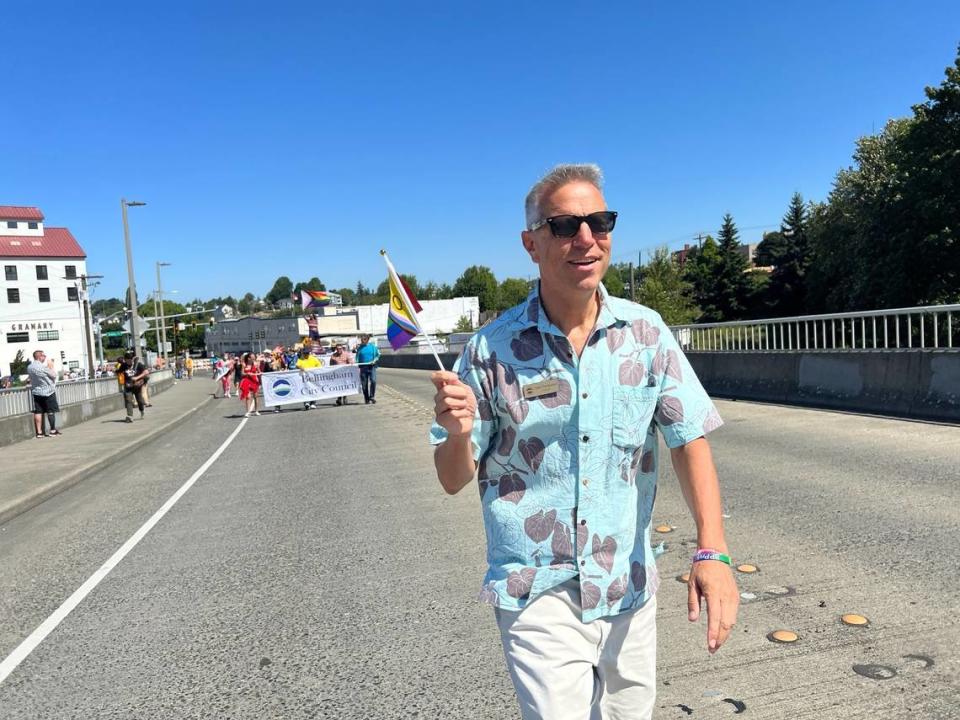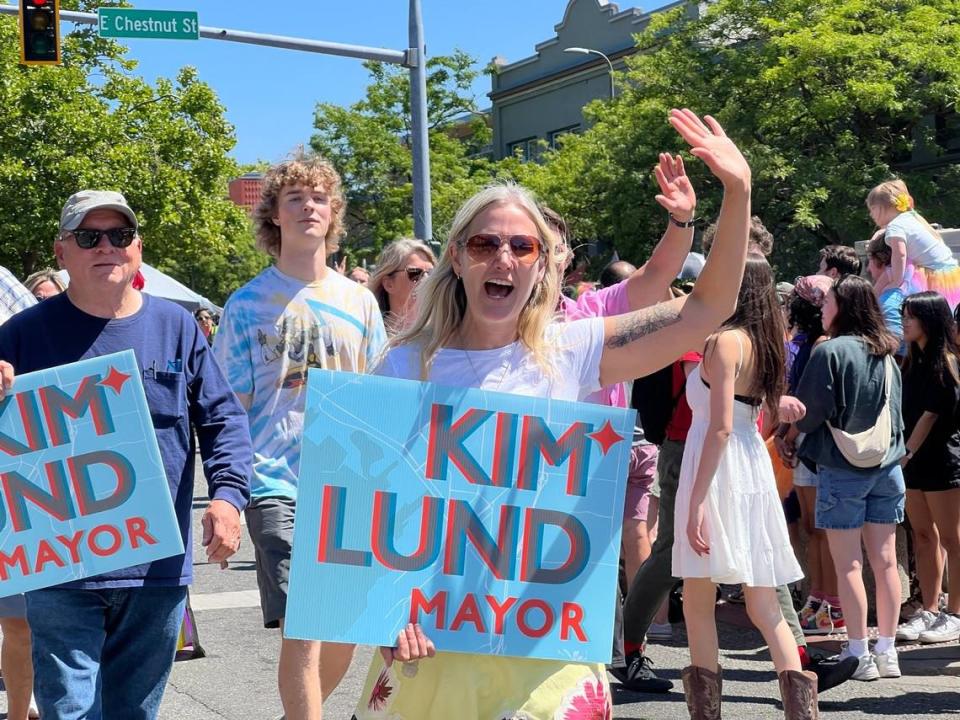Bellingham mayor facing challenge after a first term marked by COVID, housing crisis
First-term Bellingham Mayor Seth Fleetwood is facing Kim Lund, former head of the Bellingham Public Schools Foundation, in the Nov. 7 general election for mayor, after they finished first and second in the August primary.
Fleetwood took 37% of the vote in a six-way race, and Lund had 25%.
City and county races are nonpartisan in Washington state. Nevertheless, Fleetwood and Lund were listed as “certified Democrats” on the Whatcom Democrats’ web page for endorsements and recommendations. The Whatcom Republicans made no endorsement in the Bellingham mayor’s race.
All voting is by mail in Washington state. Ballots must be postmarked — not simply placed in the mail — by 8 p.m. Nov. 7 to be counted.
Ballots can also be placed in official ballot drop boxes that will be locked when polling closes.
In Bellingham, the mayor is the highest elected official and is essentially the city’s CEO, managing the various city departments and directing public policy as set by the City Council. It’s a four-year term and the job pays $221,000 annually.
Candidates are listed in the order that they appear on the ballot.

Seth Fleetwood
Fleetwood, a lawyer and lifelong Bellingham resident, has more than 25 years of experience in community and government service, including two terms on the Bellingham City Council and two terms on the Whatcom County Council before his election as mayor in 2019.
A South Hill resident, Fleetwood graduated from Bellingham schools, the University of Washington and the Willamette University College of Law.
“I know how to run the city,” Fleetwood told the Bellingham City Club at an election forum on Sept. 27.
“I know the programs, I know the people, I know the processes. I’ve been intimately engaged. I bring a collaborative approach to decision-making. I’ve made a lot of tough calls in the last several years as mayor of Bellingham during a very challenging time,” he said.
Two months after Fleetwood took office, the COVID-19 pandemic struck, forcing city employees to shift to working from home and focusing their efforts on supporting Whatcom Unified Command with personnel and funding to manage the crisis.
In an interview, Fleetwood told The Bellingham Herald that “suddenly, I was in emergency response” and had to put city business not related to the pandemic on hold.
Even as COVID-19 raged, the 2020 murder of George Floyd sparked a social justice movement. Fleetwood worked with Whatcom County Executive Satpal Sidhu to advance a Whatcom County Racial Equity Commission that’s getting ready to hire its first director and staff.
“I led the city through one of the most difficult challenges in modern times while prioritizing actions on affordable housing, climate change, behavioral health, alternative response systems, public safety and health, race and justice issues and other necessary initiatives that are sorely needed and requested by the Bellingham community,” he said at his campaign website.
Then came rising rents, soaring homelessness rates, increased crime, a shortage of police officers and the fentanyl epidemic.
“To that degree, I wasn’t able to engage as much as I wanted to in progressive city-building,” he told The Herald.
But to combat the perception of a dirty and crime-ridden city center, his administration helped create a Downtown Ambassador program, hired private security patrols, assigned the Public Works Department to focus on removing trash and keeping alleys clean, along with support for the Base Camp shelter and county Health and Community Services programs for people without housing.
“In the downtown, we’re going through a tough time and we’re responding,” he said.
“Solutions don’t fit into a sound bite” for a second term, but include varied kinds of housing for a range of income levels, multi-use public buildings, additional urban trails and “third spaces” where residents can gather away from home and work, Fleetwood said.
“The most exciting work that we do is envisioning the future city that we need. We have to find a way to grow that doesn’t cause environmental harm and at the same time promotes social justice,” he said.
Fleetwood is endorsed by a range of elected officials, including Sidhu; 2nd District U.S. Rep. Rick Larsen, D-Everett; former Mayor Kelli Linville; City Council members Dan Hammill, Hollie Huthman, Michael Lilliquist, Skip Williams, and former Councilmember Gene Knutson. Other endorsements include the Lummi Indian Business Council, Planned Parenthood and the Whatcom County Democratic Women.
He’s raised $56,190 for his campaign through Oct. 25, mostly from individual contributions, according to the Public Disclosure Commission.

Kim Lund
Lund, a chemical engineer who lives in the South neighborhood, served eight years as the executive director for the Bellingham Public Schools Foundation, a nonprofit that supports district schools.
She attended Bellingham schools and has a bachelor of science in chemical engineering from the University of Washington. She completed the Oxford Leading Sustainable Corporations Programme from the Said School of Business at the University of Oxford.
She’s also is a member of the Whatcom County Planning Commission and the Bellingham Public Schools Sustainability Advisory Group, and serves on the board of Brigid Collins Family Support Center and the Whatcom Million Trees Project.
As head of the Bellingham Schools foundation, Lund said she persuaded the parent-teacher associations at the various schools to commit to pooling their fundraising instead of having students in a school in a poor area of town miss out on opportunities that others could afford.
“We shaped parent-teacher fundraising in this community to be more equitable. I got every parent group in every school to share their resources so that we were lifting up the schools with the least means and the most needs,” Lund said at a League of Women Voters election forum on Oct. 17.
Lund told The Herald that she has a vision for a “safe, stable and thriving” city during her primary election campaign.
In an October interview, she said that addressing the lack of affordable housing is the key to reigning in rent hikes, encouraging economic development and reducing homelessness.
“We’re having the growing pains of becoming inaccessible,” Lund told The Herald.
“It is holding us back from growth. People come here and assess it and say, ‘I can’t afford it. [We must] create housing so people can afford to live in the community where they work,” she said.
To that end, Lund would boost hiring in the Planning and Economic Development Department, “fast track” certain kinds of affordable housing, and reduce permitting fees for other kinds of residential construction.
“The other piece of this is that we have a renter-majority town. We have a rental-inspection program with no enforcement. There are many landlords who are invested in their tenants. [But] it’s essential that we hold landlords to account. It’s low-hanging fruit,” she said.
“The bad conditions that some of our renters are facing, they just don’t feel like it’s temporary,” Lund said.
Affordable housing and renter protections will help ease the homeless crisis, she said. She favors short-term temporary measures such as safe parking for people who live in cars and RVs and additional tiny homes.
In addition, Lund would pursue a regional approach to homeless services and she favors a shelter that’s not operated by a religious organization.
“I want to connect people to a different future. Homelessness is directly connected to housing affordability. We need state and federal support. [We] need a dedicated lobbyist” who can advocate for the city, she said.
Lund is endorsed by unions that represent a majority of city employees, including Bellingham-Whatcom Firefighters Local 106, the Bellingham Police Guild, the Joint Council of Teamsters No. 28, and the Guild of Pacific Northwest Employees Bellingham Local 1937.
“I think that’s a really powerful message and something that I would encourage voters to consider,” she said. Her other local support includes the Whatcom County Association of Realtors, the Riveters Collective, the Sierra Club, the Nooksack Indian Tribe, Planned Parenthood and Bellingham City Council members Lisa Anderson and Kristina Michelle Martens.
She has raised $93,674 for her campaign through Oct. 25, with about two-thirds from individual contributions and the remaining third from businesses, unions and political action committees, according to the state Public Disclosure Commission.

